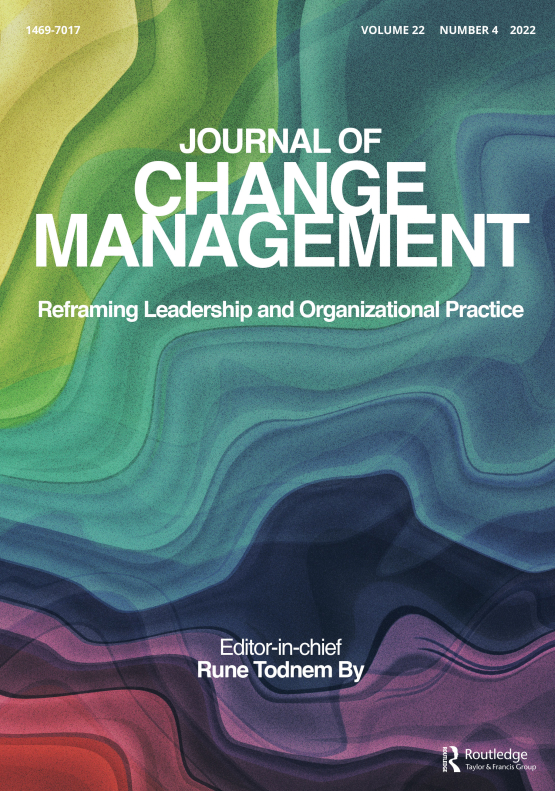Submit a Manuscript to the Journal
Journal of Change Management
For a Special Issue on
Organizing for community in disruptive times and spaces
Manuscript deadline
31 December 2024

Special Issue Editor(s)
Anna Uhlin,
Mälardalen university
[email protected]
Lucia Crevani,
Mälardalen university
[email protected]
Perttu Salovaara,
The Metanoia Institute
[email protected]
Organizing for community in disruptive times and spaces
We are witnessing profound changes in how work is performed and working life organized, not least due to digitalization, geopolitical developments, and crises such as the recent pandemic. Such changes challenge the traditional ways of conceiving of phenomena such as leadership, organizational identity, cohesion, to mention a few. They more broadly call into question how work is organized and led, in particular what organizations are and how they are 'held together'.
New ways of working based on post-bureaucratic practices, self-management ideals, shared leadership arrangements challenge traditional hierarchical organizational forms and imply the emergence of new structures, as well as new organizational and management practices; it has even been suggested that these flatter organizations may be characterized as community-led. Moreover, our increased reliance on digital or hybrid ways of interacting and collaborating has also disassembled traditional workplaces and redistributed work in time and space. The realization that work is collective and that distributed ways of working require new ways of ‘holding’ together people and processes has brought the issue of how to organize for community to the fore. Digital technology may both enable the dispersion of work in space and time and its coordination across space and time. The practice of work meetings, for instance, is central to the creation and maintenance of a sense of community – but how does this work in the new hybrid work settings?
Questions such as how organizations can be “held together” and how workers may experience a sense community in this new landscape of work practices are urgent to answer in order to develop our understanding of how to organize and lead in a changed context for work, as well as what the consequences of the diverse offer and use of digital applications are. It is time for elaborating a reflective and critical discussion about ongoing organizational changes, their management and the emerging changed leadership practices.
Community is a concept with a long history in social sciences, but is still rather under-explored in organization and management studies. In this special issue we therefore invite papers that shed light on the issue of organizing for community in disruptive times and spaces. Community is to be understood in a broad sense:
- community as a noun,
- community as “sense of community”,
- as well as community as process or practice.
Contributions developing knowledge on ‘organizing for community’ from different ontological, epistemological, and ideological perspectives are welcome: those treating community in instrumental terms as well as those focusing on community due to ethical reasons. Moreover, since contemporary organizing is challenged by disruptive times and spaces, there is a need of not only contributions discussing community per se, but also contributions focusing on methodological and ethical considerations related to doing research on ‘community’.
Therefore, in this special issue we invite to an exploration of the dynamics of contemporary organizing and different aspects of ‘community’, exemplified by but not limited to connection, solidarity, alignment, collective effervescence, sense of belonging, friendship, social cohesion, and group cohesion. We also invite prospective contributors to focus on the implications for the doing of leadership and/or the re-framing of organizational practices, in line with the focus of the journal.
Finally, the Nordic countries present a context characterized by a specific heritage in which community, the collective and collective solutions, solidarity, democratic inclusion, and collaboration have been central to politics, working life, industrial organization and to the relation between employers and unions – the “Nordic model”. At the same time, the Nordic countries can also be characterized as individualistic and are also affected by global developments such as for instance the flexibilization of work. Therefore, in this special issue we are particularly interested in contributions that make reference, theoretically or empirically, to one or more of the Nordic countries, or that compare Nordic countries to other contexts. Contributions referring to non-Nordic countries are however also welcome.
Accordingly, this Special Issue will seek papers that can delve into such un- or underexplored areas including, but not limited to:
- Meetings and community
- Leadership and community
- Managing change and community
- New organizational forms and community
- New ways of working and community
- Changing spaces and community
- Changing times and community
- Doing research on community – ethics and methodology
Looking to Publish your Research?
Find out how to publish your research open access with Taylor & Francis Group.
Choose open accessSubmission Instructions
Authors whose papers are initially accepted for the special issue will have three months after receiving their review to submit their revision.
Select "Organizing for community in disruptive times and spaces” when submitting your paper to ScholarOne.
If you have questions, please contact Anna Uhlin at [email protected]